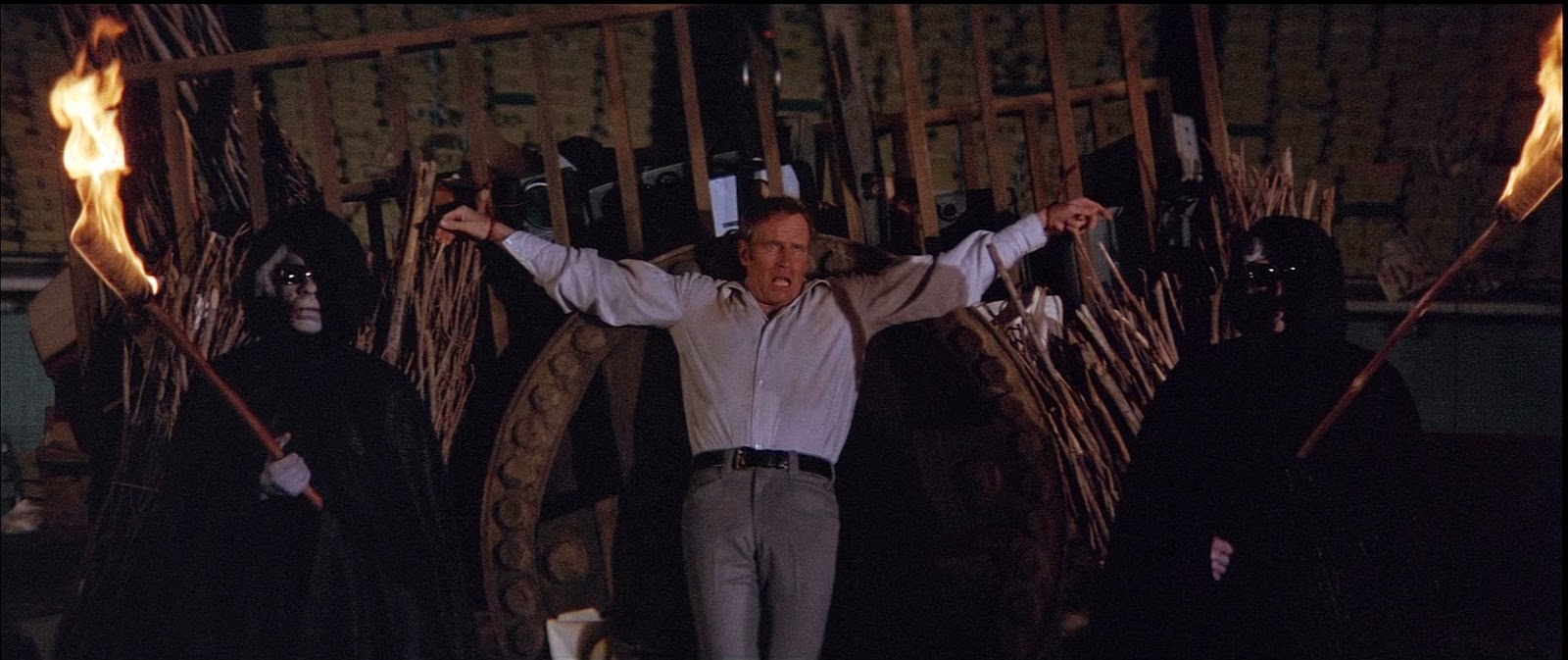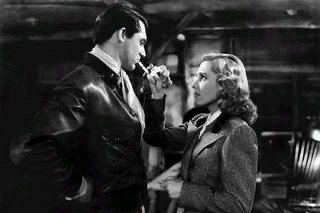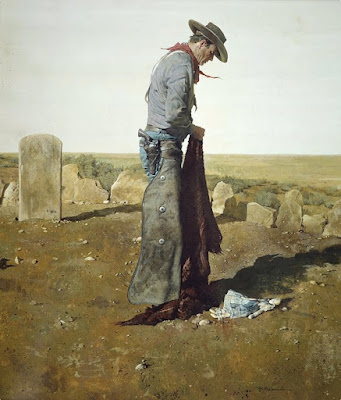 "Come Out, Ne-ville! Coooome Ouuuut!"
"Come Out, Ne-ville! Coooome Ouuuut!"
I have been in love with Richard Matheson's 1954 novel "I Am Legend" since I first read it in high school. A horror/sci-fi story, it tells of a world-wide plague that turns the world's populace into either corpses or vampires, except for the one man who carries the immunity from the disease, and who spends his days hunting the infected, and his nights being hunted by them.
The images played out on the pages are searing, and Matheson's romantic way of writing the isolation of being "The Last Man on Earth" palpable. Plus, it has one ingenious kicker that makes the whole idea a perfect conceit that resonates and makes the story such a brilliant concept. It is literally mind-bending and perception-altering.
It has been filmed three times, each version having its own strengths (lead performances, always—what actor wouldn't want to play a role so dominant to the movie?) and weaknesses, but none of the them really coming to the heart (er, so to speak) of the story.
The Last Man on Earth (Ubaldo Ragona/Sidney Salkow, 1964) Vincent Price stars as Dr. Robert Morgan, the last survivor of a plague that has turned the majority of the Earth's population into vampires. By day, he lathes a number of wooden stakes and hunts down the creatures, driving the stakes into their hearts to kill them. This is the the closest the movies have come to Matheson's original concept, although the ending is changed, making Morgan an ersatz Christ-figure*, impaled by a spear in a church, his arms flung wide in a crucifixion pose. Made in Italy on the cheap, The Last Man on Earth is still a satisfying film merely for the strength of the ideas, the dusky black and white cinematography and Price's excellent performance. But don't take my word for it--you can download it or stream it here. It's been in the Public Domain for years (although MGM has come out with a nicely re-mastered version on DVD).
The Omega Man (Boris Sagal, 1971) Army Colonel Dr. Robert Neville (Charlton Heston) survives a world-wide plague as a result of a biological war between the Chinese and Soviets. Holed up in a bunkered apartment in Los Angeles he leads a solitary life: by day blasting the mutated victims with his high-powered, high-intensity-beamed assault rifle; by night listening to their taunts, armored against their organized attacks. The mutants are light-sensitive albino's, banded together as a sort of political/sociological cult ("The Family"), led by a zealot named Matthias (Anthony Zerbe), who see Neville as a threat to their way of life, and well, yeah, that's a pretty effective rifle he hauls around. Using his own blood's immunity, he's trying to bring back the pigment-challenged. One of Heston's interesting forays into sociological sci-fi in the 70's, The Omega Man lays it on a little thick and heavy with the race-relations metaphor, but the cast is uniformly excellent especially Heston and Rosalind Cash. Again with the Christ-allegory as Neville is impaled in a fountain, arms floating out in a crucifixion pose while giving his life-saving blood to the rag-tag band trying to carry on his work. Though not strictly Matheson, it does reflect the times in which it was made.
"My name is Robert Neville. I am a survivor living in New York City. I am broadcasting this message on all AM frequencies. I will be at the South Street Seaport every day, at mid-day, when the sun is highest in the sky. I can provide food. I can provide security. I can provide shelter. If there is anyone out there. Anybody. Please. **
You are not alone."He has been waiting in his private hell for three years.
The effects work of a deserted Manhattan is nothing short of astonishing and several shots of Neville tracking deer in his Mustang GT500 are played out to please any action aficionado. Kudos to director Lawrence (who managed to salvage a good movie out of Constantine against all odds). Smith is amazing throughout this movie. He's the only game in town, literally, and he is extraordinarily frugal in what he displays throughout the first two-thirds of this movie. His rituals, his by-play with Sam, his clinging to normalcy, and his studied work ethic never give a hint that he's cracking up. Flashbacks in moments of unconsciousness are the only indication of his loss and his desperate feelings of responsibility. At some point, something's got to snap.
When they do, they take the movie with it. Oh, things are intriguing for a good long time after that, and it appears that everything's fine--it's a bit like the plague really. But at some point, it becomes a confused muddle, story-wise and philosophy-wise, and that I place squarely at the hands of script-"doctor" Akiva Goldsman.***
Warning! Quarantine Zone!First, let's back-track to the novel. In Matheson's original story, Neville discovers that not all the contaminated inhabitants have been turned vampiric. Some have been merely rendered sensitive to light, and during his daytime raids, Neville has killed a bunch of them. A representative from this group infiltrates his stronghold, and fills him in, telling him that he is now considered on the same scale as the the vampires of legend, coming to their houses in their sleep and killing them. Neville is eventually captured and sentenced to die for his crimes. In his cell, waiting to be executed, he ponders the irony that, now, he is the legend of death, not the ones he was hunting down.
Stand by for a retinal scan and display your ticket stub! This quadrant infected with Viral Spoilers! If you have not seen the movie, proceed no further!! I repeat, proceed no further!!!
Now, back to this latest movie. Things go swimmingly the first two-thirds of it, but things begin to snap after Neville rather ingeniously captures a female mutant to test his vaccine on (GA Series 319, compound 6, trivia-buffs). He makes a report that the mutants**** (standing in for Matheson's vampires) have stopped showing any sign of human behavior. Then he's immediately proven wrong in the most elaborate way possible--they emulate his own Rube Goldberg trap. Nothing is made of Neville's obvious miscalculation. By this time, his grief is too great and he's not thinking. And the movie is going someplace else and not using The Scientific Method doing it.
He is rescued at a very opportune time by two other survivors, who have heard his radio message and take him back to his apartment. All well and good. Something has to give in this version of the scenario or there's no forward momentum. The woman tells him that God directed her to him to take him to a Survivor Stronghold in Vermont, to which Neville (no doubt because he's a scientist) gives her the statistics of the disease (90% dead, a few percent mutant, who eat the immune-which when you think about it, might cure them, but no such luck) telling her that with such an effective kill-rate that there can't be a God, and that we did it to ourselves, thank you very much.***** She then replies that its easier to hear God when it's so much quieter (sounds like Goldsman with the happy-meal schizophrenia, again).
So, what happens? The mutants storm Neville's strong-hold for the Third Act Attack--a staple of any action movie, and our plucky survivors head for the fairly impregnable lab, where it becomes quite apparent that Mutant #1 is going to break through the glass to get to his souless-mate. Neville grabs his vaccine, gives it to the other survivors and tells them if they find the Survivor Stronghold to give 'em that blood sample--that un-refrigerated, bound-to-go-bad blood sample--to further his work, sticks 'em in a secret hidey-culvert and tells them to leave when it's light. Then he blows himself up with a grenade and takes the mutants with him, because, as we all know from watching the news, suicide-bombing is the very epitome of heroism these days.******
Fade to Black. Our two survivors end up at the fortress-walls of the survivor colony. What will they find when they get there? More mutants? A blasted Statue of Liberty in the sand? Harrison Ford and Sean Young in that other ill-considered feel-good ending to a sci-fi movie? No, the door opens on an idyllic little town with a Main Street, and in the background a white church-steeple with a bonging bell. They've come just in time for services, it appears. And hopefully the guards with the machine guns won't force them to attend.
What we have here is one step beyond using Neville as a Christ-allegory. It's a pro-religion/anti-science zombie movie. If the Vatican was "consoled" by The Golden Compass's soft opening, they must be positively spilling wine on their cassocks celebrating over this one!As good as it starts out, this one takes "I Am Legend" so much farther afield from its source material than the others, that I can't be happy about it. Smith is great. The abandoned Manhattan scenes are amazing. But...
The script obliterates a great book for another hokey feel-good ending. After all, isn't that how you're supposed to feel after a devastating plague with a 90% kill-ratio? The film ends with a Bob Marley tune (kudos to that, but Marley is used for another confused metaphor that in the context of the film is just stupid). Maybe they should've ended with a rousing up-beat group-sing of "Tomorrow" from "Annie."
Gloriosky in the highest.
* I could do a few dozen pages on "Christ-allegories-in-the-movies," but let's just point out a few of them: E.T., the Extra-terrestrial, Cool Hand Luke, The Star Wars films, Braveheart, Narnia (of course), Blade Runner, The Superman films (especially.."Returns"), The Matrix, and ad infinitum spiritu.
** In just one of the beautiful touches in his performance, Smith's voice cracks on that one word only.
*** The name "Akiva Goldsman" on a writing or producing credit is enough to spoil any movie-going experience for me, although I have always given the benefit of the doubt--but than as I'm sure Goldsman would tell me, repeating any behavior expecting an outcome that never occurs is a sign of insanity. It was Goldsman who destroyed the first "Batman" movie franchise with his cartoonish, pun-heavy scripts. He "cracked" the script for A Beautiful Mind by reassuring movie-goers that schizophrenia was nothing more than delusions of grandeur with visions of Ed Harris and Paul Bethany included--forget any unpleasantness. His by-the-numbers adaptation of The DaVinci Code made it boring for anyone who read the book, and breezily incomprehensible for anyone who didn't. His scripts for Practical Magic and Lost in Space are overworked humorless muddles. And I, Robot had one good, recycled and paranoid idea in its empty little head and chucked the great ones of Isaac Asimov. I'm not sure "whose windows he's washing" to be so successful with so much hack-work in his resume, but the man is the 21st Century Joe Eszterhas.
**** I've been calling them Danny Boyle "Red Bull" zombies, as they have the same out-sized aggressive energy as Boyle's 28 Days Later zombies, but with a case of the energy drink in them. They are pigment-less, hairless albino's who start to burn at the first touch of sun, and during the day they apparently huddle in dark spaces and huff and puff spasmodically. And they screech a lot, with distended CGI-enhanced faces. So, they're basically vampires, but zombies have a higher "Q" rating, so they're called zombies.
***** I will say, however, that how the mutating disease comes to be is not only a plausible scenario, but wickedly likely.
****** Ah, but wait. This ending was a substitute for the one that didn't "test" well with preview audiences. Evidently, they wanted more action, even if that action was ultimately destructive to the point of the story and hewed closely to the endings of the other adaptations. ("Hey, dude, just blow something up!"). Here is the original ending to the latest I Am Legend, where Neville does indeed have a perception-altering experience, and realizes that...maybe he was wrong.








































